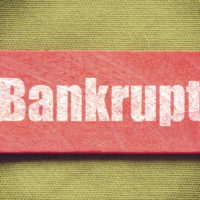The Pros and Cons of Filing Personal Bankruptcy

Filing Personal Bankruptcy : Pros and Cons
With the economy constantly changing, many are finding it much more difficult to manage finances, expenses, and debt. The last thing many people want to do is file for bankruptcy, but sometimes it might be the only choice. If you are feeling overwhelmed with paying your bills or you are constantly being threatened with foreclosure and repossession, filing personal bankruptcy may be the best option.
Not only can filing personal bankruptcy offer you relief from creditors, it can also provide you with a fresh financial start. Although filing for personal bankruptcy should be a last resort, it does have its benefits. Filing bankruptcy can provide you with a solution to your financial woes that you may have been battling over a long period of time.
Some of the most common reasons for filing for bankruptcy include :
- Relief from all debts; also known as ‘discharge’
- Cease your wages from being garnished
- Stop repossessions from happening or threats of repossession of personal property, such as your car, home or other assets
- Stop harassment by creditors and debt collectors
What Kinds of Bankruptcy Are There?
There are two kinds of bankruptcy available when personally filing. It’s important to speak with a professional Florida bankruptcy lawyer to figure out which form of bankruptcy might be right for you and your situation.
Chapter 7
This is often referred to as liquidation. If you have large amounts of debt such as unpaid medical bills or credit cards, this may be the best choice when filing for bankruptcy. This method will require you to give up all property that is nonexempt to a trustee. This is the process in which creditors are paid. Choosing this route will relive your from your debts and allow you to keep some property if regular payments are made.
Chapter 13
This is often called reorganization. This is the preferred method if you do have a source of income but need extra time to continue making regular payments. This route will allow you to keep items such as your home and vehicle as long as you can continue to make regular, on-time payments. You may be given an extra three to five years to pay off debts.
Related Post :-
- Should I Stop Paying My Bills If I’m Going to File for Bankruptcy?
- 3 Types of Bankruptcy and What They Mean to You
Disadvantages
The cost of filing bankruptcy itself can be rather expensive. The price can range anywhere from $1,000 to $2,000. If your debts are under $5,000, it almost isn’t worth filing for bankruptcy. In addition, filing for bankruptcy stays on your credit report for at least ten years. While some businesses will still allow you to proceed with using your credit cards, the interest rates that are tacked on to purchases can sky rocket.
Contact Bankruptcy Lawyers in West Palm Beach
If you have finally reached the decision that bankruptcy is best for you and your family, or are in the process of considering bankruptcy options, don’t hesitate any longer and contact the lawyers at Kelley Kaplan & Eller to see how we can help. Financial worries are stressful enough, so allow our professional team to help you handle some of your financial issues and even see if filing for bankruptcy is right for you. Call us today at 561-264-6850 and schedule a case evaluation. We will review your concerns, draft a case, and answer any questions you might have related to personal bankruptcy.



